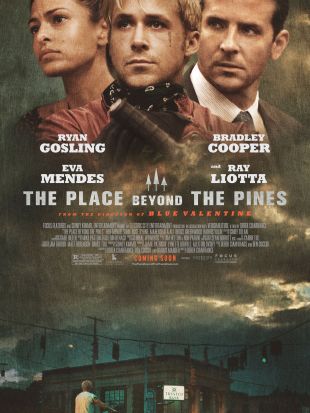
Derek Cianfrance made a name for himself with his improvised marriage drama Blue Valentine, but he takes a very different approach with his follow-up to that breakthrough film. In The Place Beyond the Pines, he's crafted a sweeping three-act story with such skill that, for a good two thirds of it, viewers have the unique pleasure of not knowing what's coming next even though every step is completely logical.
Ryan Gosling (who was the male lead in Blue Valentine) stars as Luke, a chain-smoking motorcycle stunt driver who works at a traveling carnival riding his bike inside a big steel ball with two other daredevils, whizzing around each other at life-threatening speeds. An old flame (Eva Mendes) reappears and tells him that he has a one-year-old son, triggering a desire to do right by his offspring. In response, Luke quits his job and resorts to less-than-legal endeavors. This choice brings him into contact with Avery (Bradley Cooper), a rookie cop with a law degree whose ambitious father -- a former state judge -- knows how to play all the angles. Although their interaction is a brief one, it forever changes not just the lives of the two men, but their children's lives as well.

There is much to admire in The Place Beyond the Pines, but the first thing viewers will respond to is Gosling, an actor who can simultaneously project masculinity and vulnerability better than anyone in his generation; there's a reason he's become both a sex symbol and the subject of a feminist Internet meme. Luke is covered with tattoos, rippling with muscles, and capable of great tenderness, but short on common sense, good judgment, and impulse control. Gosling not only can play all of that, but also comes off as a credibly gentle father whenever he holds his baby boy. It's yet another impressive performance from a remarkable young talent.
Cianfrance's first-rate script, co-authored with Ben Coccio and Darius Marder, keeps you guessing even while making total narrative sense. Characters make bad decisions and there are repercussions for them, just not the ones we necessarily expect. In addition, during the middle segment in which Cooper's do-gooder cop comes face-to-face with corruption in his own department, the movie becomes an expert thriller alongside a moving drama examining the psyches of its two main characters.
If only the third act had kept us guessing as effectively as the first two, Cianfrance would have had an all-time classic. But once it becomes apparent how this saga must end, we get ahead of the story for the first time, and it's a letdown because we've been so expertly misdirected for the initial two thirds of the picture.
That said, a film this well-constructed, superbly acted, and thoughtfully humanistic is rare; it's the kind of movie many people say can't get made any more. It has the scope and depth of a novel, doesn't dumb itself down, and trusts the audience to have patience. With just two films together, Cianfrance and Gosling have all the makings of a superb long-term director/actor relationship.
